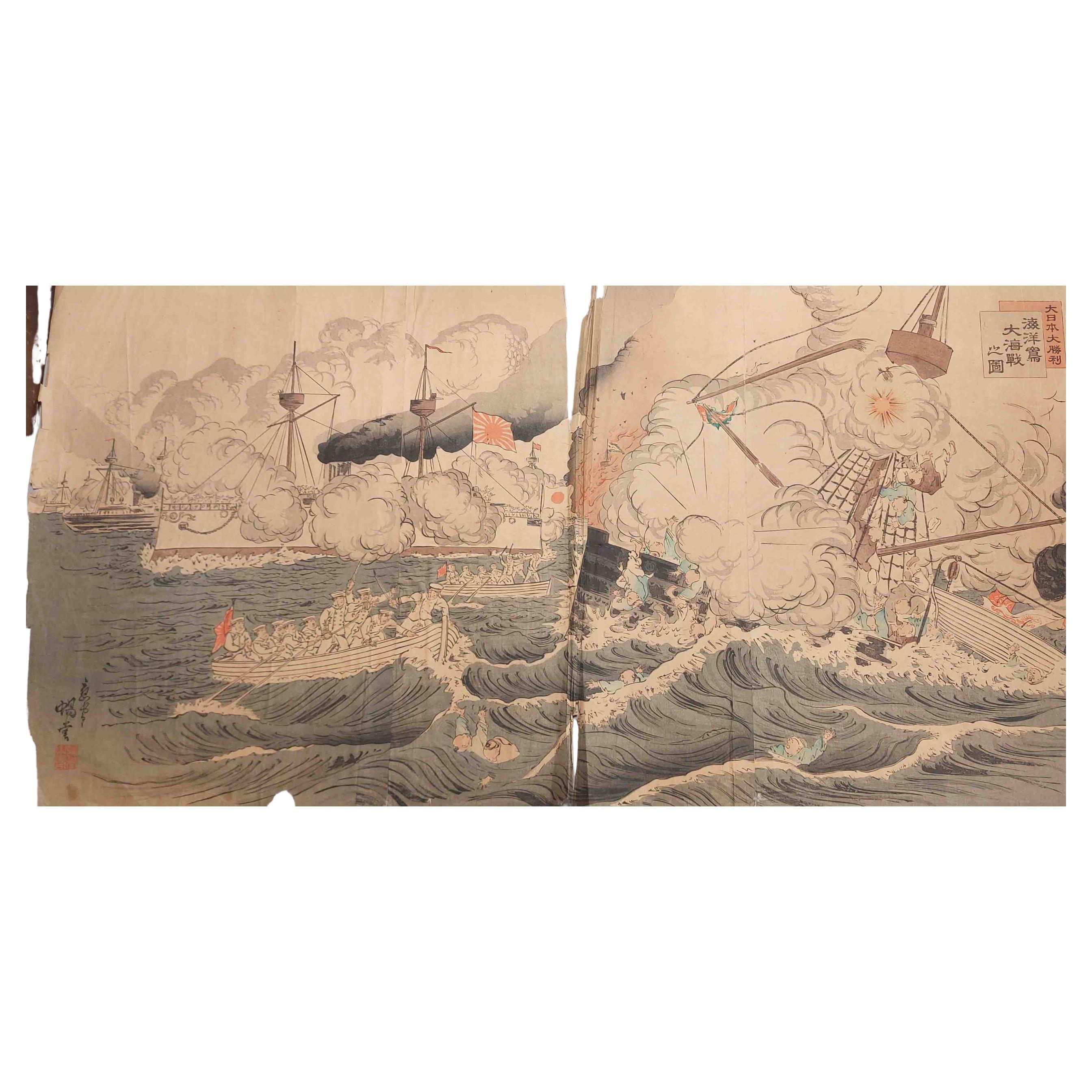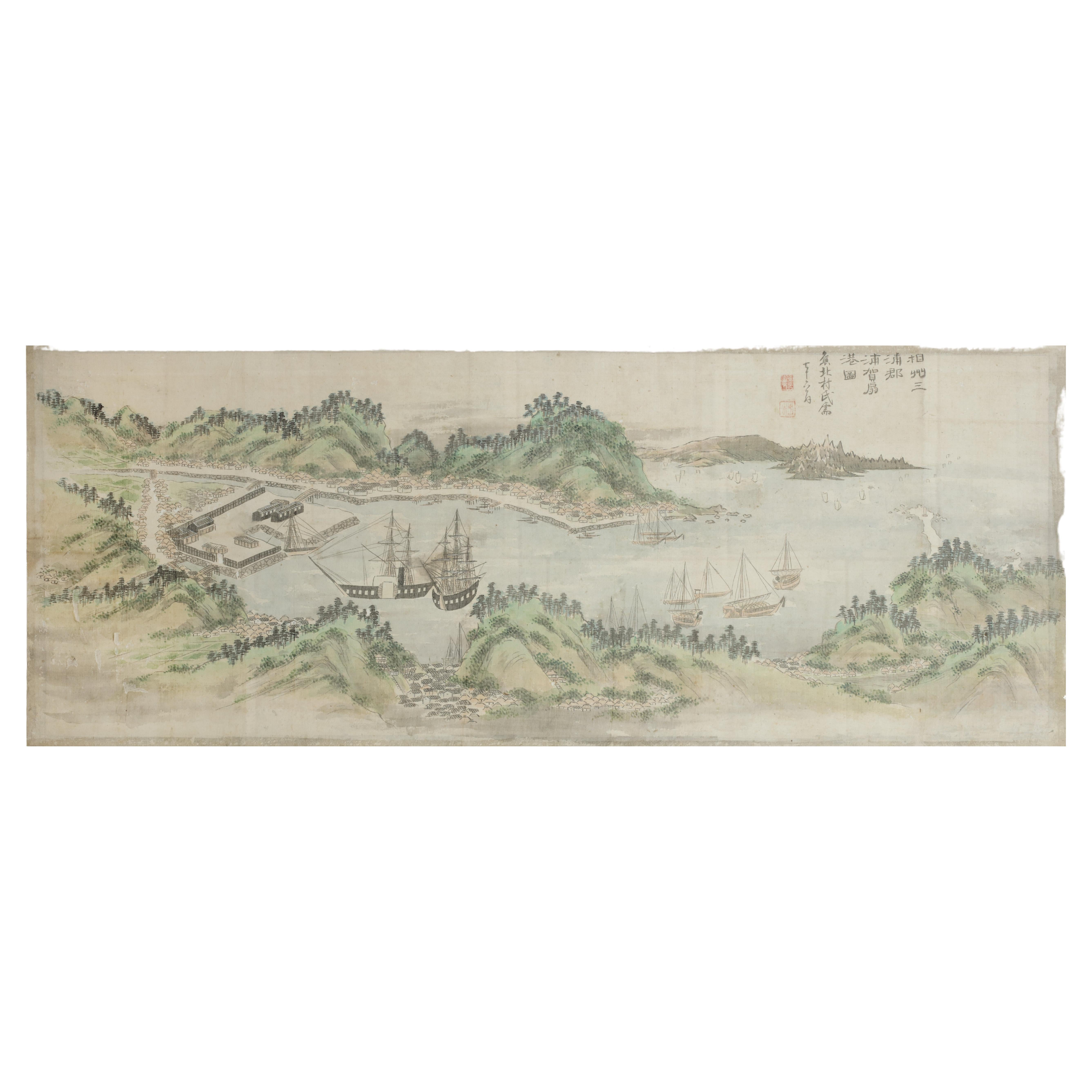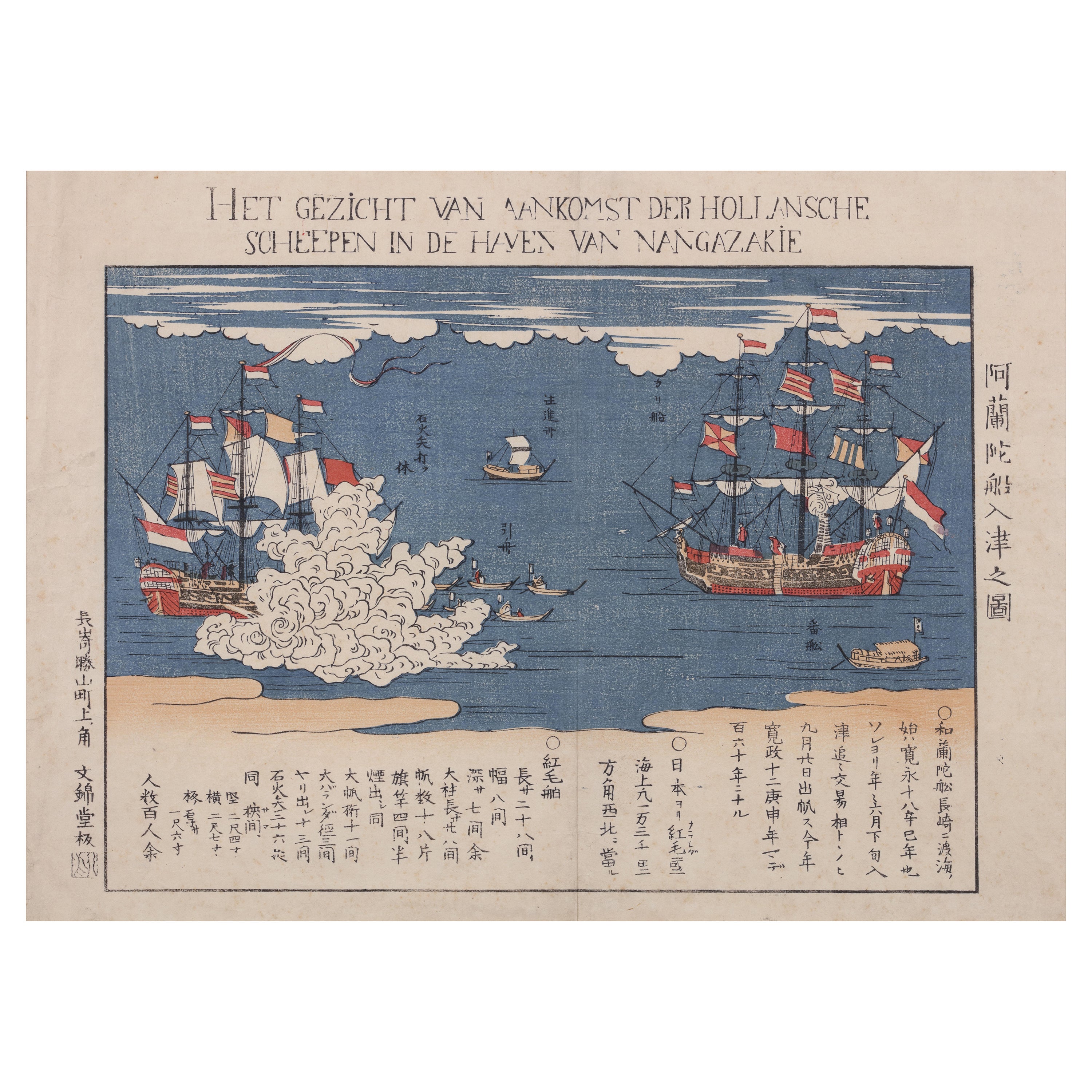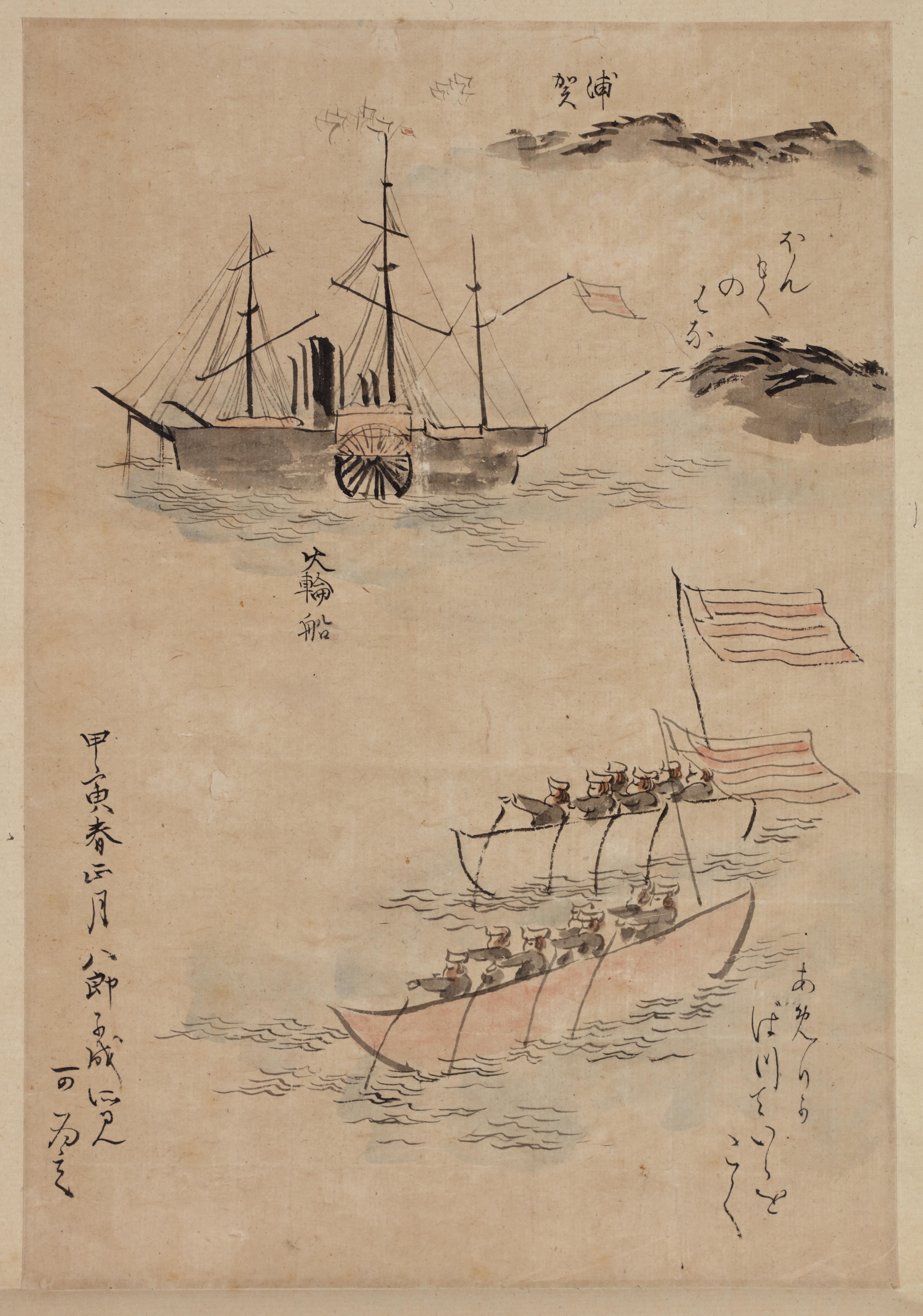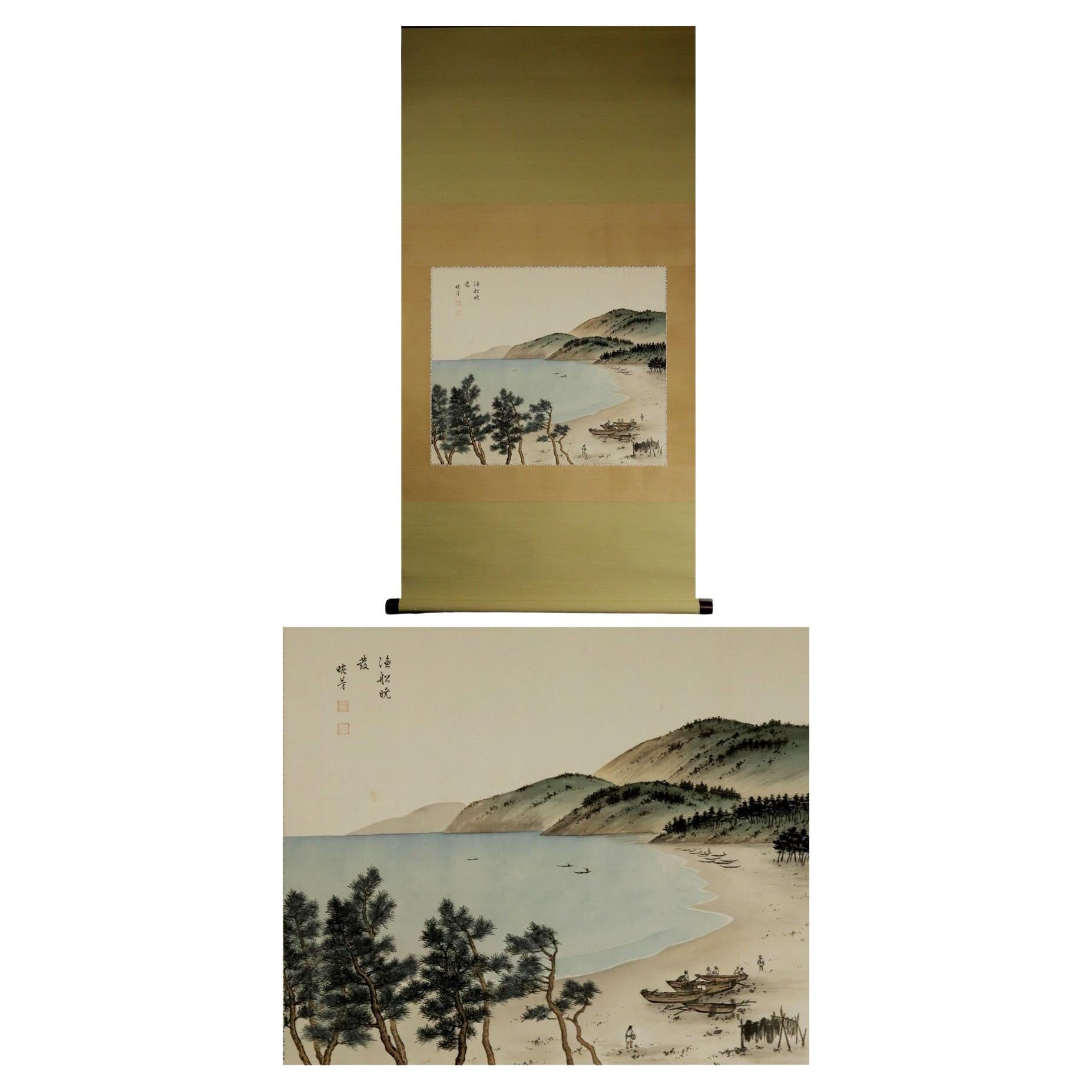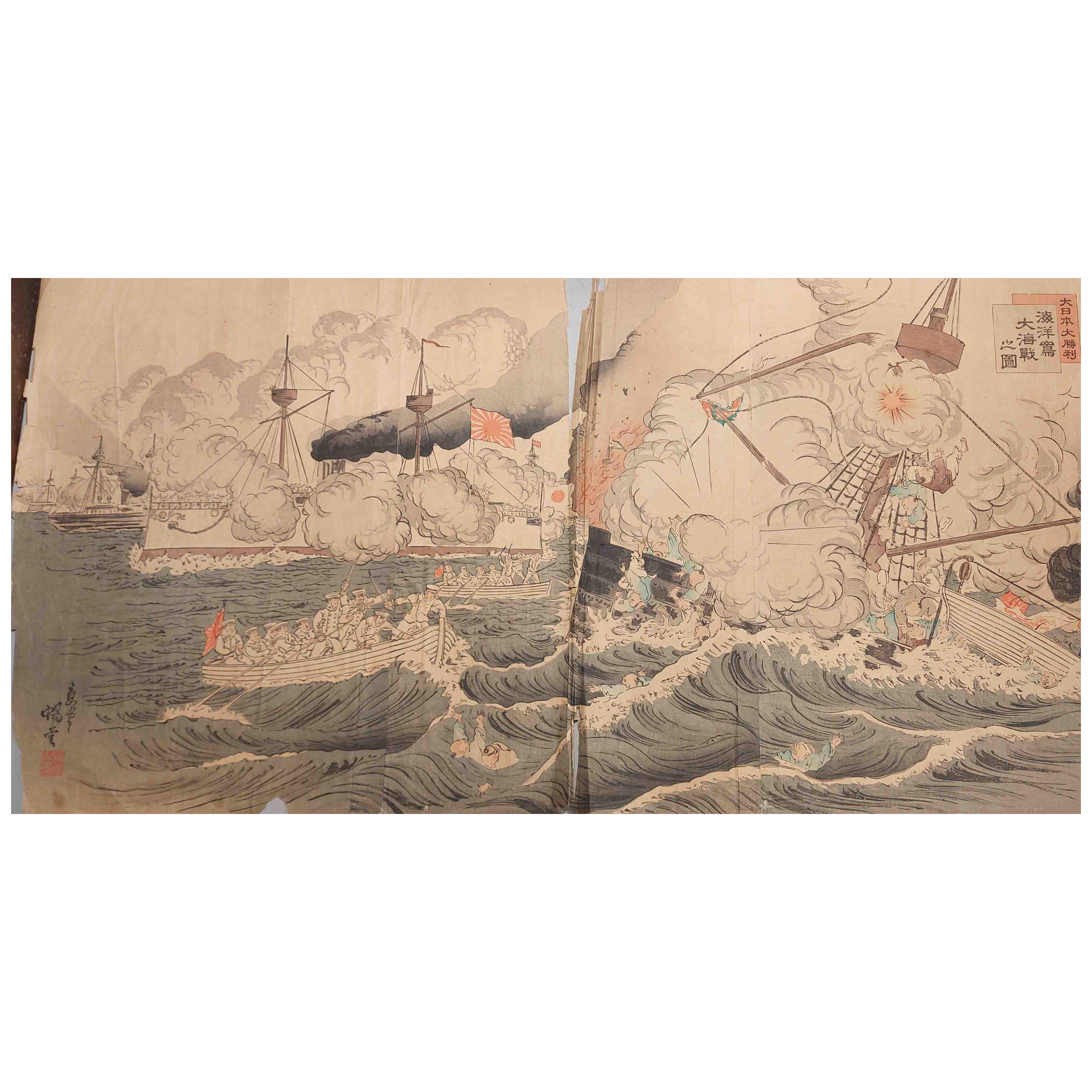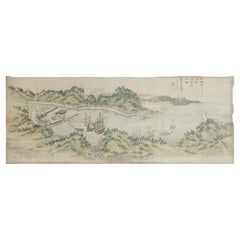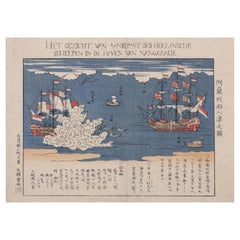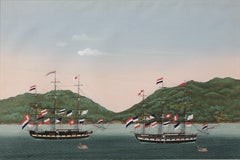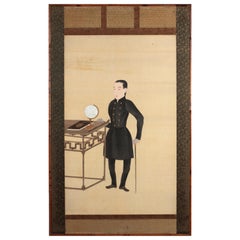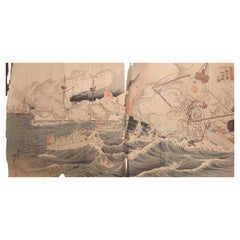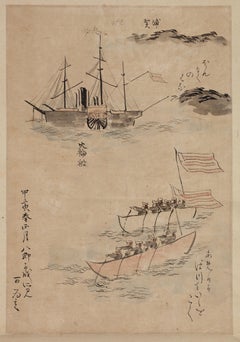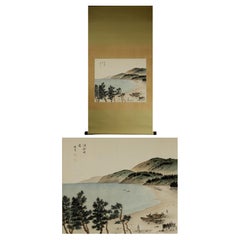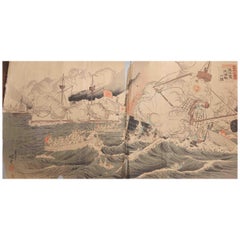Items Similar to Japanese Painting Depicting Commodore Perry’s Ship with Buddhist Monks Aboard
Want more images or videos?
Request additional images or videos from the seller
1 of 6
Japanese Painting Depicting Commodore Perry’s Ship with Buddhist Monks Aboard
$89,390.25
£66,192.95
€75,000
CA$122,925.01
A$136,724.18
CHF 71,558.51
MX$1,667,584.11
NOK 899,158.68
SEK 845,774.82
DKK 570,998.12
About the Item
A Japanese painting depicting Commodore Matthew Perry’s flagship USS Mississippi bringing the coffin with the remains of US marine private Robert Williams who died while serving on the USS Mississippi in Japan, March 6, 1854, aged 21, to the cemetery of the Buddhist Gyokusen-Ji temple in the city of Shimoda
Late Edo period, Bakumatsu, circa 1854
Measures: H. 57.2 x W. 47.8 cm (formerly mounted on a scroll, can be remounted on a scroll)
In the painting is depicted, the USS steamship Mississippi belching black smoke out of her funnel and showing her figurehead. On the front deck, an American sailor is pointing forwards, and behind him, a coffin is covered under a blue flag. The Stars and Stripes has three colours:
“The red of our country’s flag was made redder still by his (her) heroism; the white more stainless pure by the motives which impelled him (her); and, in the starry field of our nation’s glorious banner, the blue has been glorified by the service he (she) has given for America’s ideals”.
In the middle of the ship is a Buddhist monk in a red coat pointing toward the temple on the hill, and behind him, four more monks in brown coats, apparently praying. In his description of the funeral, Wilhelm Heine, the official artist on board the Mississippi, mentions the presence of a Japanese Buddhist monk and Japanese officials on board to accompany the funeral party. On the afterdeck a saluting American sailor and the helmsman below the ceremonial banner of the Gyokusen-ji temple. On top are the American and Japanese flags. On the hill are shown various Gyokusen-ji temple buildings and the graveyard. Gyokusen-Ji is a Buddhist temple located in the city of Shimoda, which later served as the first American consulate in Japan, where the Japanese authorities allowed the bodies of American, and also of Russian sailors to be buried in a Christian ceremony in the graveyard of the temple. Now the temple hosts the Townsend Harris Museum with documents, ukiyo-e, some personal effects of Townsend Harris, the first American Consul General to Japan in 1856, and other items describing the temple during the Bakumatsu period.
In July 1853, the Americans under Commodore Matthew Perry for the first time arrived with his flagship USS Mississippi, the Susquehanna and two sloops in the harbour of Shimoda. Perry remained in Edo Bay until the Shogun accepted an official letter by President Millard Fillmore. In February 1854, Perry returned with a larger fleet of nine ships and remained in Edo Bay as part of a show of force until the signing of the Convention of Kanawaga on 31 March 1854, opening several Japanese harbours for American ships. During the negotiations, the Gyokusen-ji temple hosted the American officers of this flotilla.
Marine private Robert Williams, while serving on the USS Mississippi, died on 6 March 1854 of the ill effects of an earlier received blow to his head given by a Chinese, while Williams was on liberty in China at Cumsing Moon. His body had initially been interred in Yokohama in a Christian burial service conducted by Reverend George Jones on 9 March 1854. After the signing of the Convention of Kanawaga on 31 March, a decision was made to relocate his grave to the grounds of the Gyokusen-Ji temple in Shimoda, prior to the fleet’s departure in June 1854. The funeral of Robert Williams can be seen as the first Christian burial ceremony allowed to take place on Japanese soil since the sakoku edict of 1639 and is the symbolic end to the sakoku policy of the ‘closed country’.
- Dimensions:Height: 22.52 in (57.2 cm)Width: 18.82 in (47.8 cm)Depth: 0.08 in (2 mm)
- Style:Edo (Of the Period)
- Materials and Techniques:
- Place of Origin:
- Period:
- Date of Manufacture:circa 1854
- Condition:Wear consistent with age and use.
- Seller Location:Amsterdam, NL
- Reference Number:1stDibs: LU5458229665652
About the Seller
5.0
Recognized Seller
These prestigious sellers are industry leaders and represent the highest echelon for item quality and design.
Established in 1985
1stDibs seller since 2020
23 sales on 1stDibs
Typical response time: 5 hours
- ShippingRetrieving quote...Shipping from: Amsterdam, Netherlands
- Return Policy
Authenticity Guarantee
In the unlikely event there’s an issue with an item’s authenticity, contact us within 1 year for a full refund. DetailsMoney-Back Guarantee
If your item is not as described, is damaged in transit, or does not arrive, contact us within 7 days for a full refund. Details24-Hour Cancellation
You have a 24-hour grace period in which to reconsider your purchase, with no questions asked.Vetted Professional Sellers
Our world-class sellers must adhere to strict standards for service and quality, maintaining the integrity of our listings.Price-Match Guarantee
If you find that a seller listed the same item for a lower price elsewhere, we’ll match it.Trusted Global Delivery
Our best-in-class carrier network provides specialized shipping options worldwide, including custom delivery.More From This Seller
View AllUnpei Kameyama, 'a View of Black 'American' Ships in the Bay of Uraga Senminato'
Located in Amsterdam, NL
Unpei Kameyama (1821-1899)
A view of black (American) ships in the bay of Uraga Senminato, Miura district, June 1853
The Japanese text reads: ‘The seventy-six old men for the Kitamura-clan, drawn in 1897 on request of Yoshisada Kitamura, Himeji, the black ships which so much changed the fate of Japan, enjoy please this masterpiece by Harima Shonin Bisei who brings back memories of his young days.’
Watercolour on paper, laid down on cardboard, H. 44.5 x W. 115.5 cm
Provenance:
Collection of Yoshisada Kitamura, Himeji
Yoshisada Kitamura (1838-1899), the son of a farmer in the village of Ogawa, in the district of Harimakashikihigashi, studied under Matajiro Otaka and got heavily involved in the anti-Shogunate movement. He was active in several military incidents against the Shogunate. After the Meiji restoration, he served the Meiji government as a local official in the Himeji domain.
Kameyama Unpei was a Confucian scholar, a Shinto priest...
Category
Antique Mid-19th Century Japanese Edo Paintings and Screens
Materials
Paper
A Japanese Nagasaki-e print depicting the arrival of Dutch ships in Nagasaki
Located in Amsterdam, NL
Published by Bunkindõ han, circa 1801
Colour woodblock print, H. 32.5 x W. 48 cm
Under this view of Nagasaki Bay, the text states that the first Dutch ships arrived in Nagasaki in ...
Category
Antique 18th Century Japanese Prints
Materials
Paper
'Two Dutch Ships Anchored in the Bay of Nagasaki' by Kawahara Keiga '1786-1860'
Located in Amsterdam, NL
Kawahara Keiga (1786 - c. 1860)
Two Dutch ships anchored in the bay of Nagasaki
Sumi ink and pigment on silk, H. 27 x W. 41 cm (excl. frame)
Comes framed, see image.
?Based o...
Category
Antique Early 19th Century Japanese Paintings and Screens
Materials
Silk
$101,308
Free Shipping
Japanese Scroll Painting of Diplomat Takeaki Enomoto, Meiji, Late 19th Century
Located in Amsterdam, NL
Anonymous Japanese painter (MEIJI PERIOD, LATE 19TH CENTURY)
Portrait of Takeaki Enomoto (1836-1908)
Ink, color and go fun on silk, framed.
Painting: 79.5 x 50 cm
With fram...
Category
Antique Late 19th Century Japanese Meiji Paintings and Screens
Materials
Silk, Paper
A Japanese painting depicting two European generals
Located in Amsterdam, NL
Nagasaki, 19th century
H. 98 x W. 41 cm
Provenance:
Private collection, Portugal
Category
Antique 19th Century Japanese Paintings and Screens
Materials
Paper
Important Japanese six-fold screen depicting The Tale of The Genji, 17th century
Located in Amsterdam, NL
An important Japanese six-fold screen, depicting episodes from The Tale of The Genji
Edo period, 17th century
Ink and colour on gilded paper, H. 155 x W. 380 cm
The Tale of Genji...
Category
Antique 17th Century Japanese Edo Paintings and Screens
Materials
Paint, Paper
You May Also Like
Antique 19th c Woodblock Print by Sino Japan War Naval Battle Haiyang Island
Located in Amsterdam, Noord Holland
A very strong woodblock print
- Fantastic depiction of the naval Battle of Haiyang Island during the Sino-Japanese War. An explosion rocks a Chinese ship at right, severing the mast...
Category
Antique 19th Century Chinese Meiji Paintings and Screens
Materials
Bronze
$1,268 Sale Price
20% Off
Scroll painting of the American ship commanded by Commodore Matthew Perry
Located in Amsterdam, NL
Attributed to Ukita Ikkei (1795-1859)
Hanging scroll painting of the American ship commanded by Commodore Matthew Perry in Uraga Bay, annotate...
Category
Mid-19th Century Edo Figurative Drawings and Watercolors
Materials
Paper, Ink
Price Upon Request
Free Shipping
Nihonga Japanese Painting 1900 Meiji Scroll Fishing Boats at Gyosen Nanga School
Located in Amsterdam, Noord Holland
A drawing of the painting "Gyosen Gyosan" painted by Akifoshi. Also included is the box. This is a tasteful work depicting a fishing boat going fishing at sunrise.
■Silk back, handp...
Category
Antique 19th Century Meiji Paintings
Materials
Silk
$2,288 Sale Price
20% Off
Antique Woodblock Print by Sino Japan War Naval Battle Haiyang Island, 1894
Located in Amsterdam, Noord Holland
Fantastic depiction of the naval Battle of Haiyang Island during the Sino-Japanese War. An explosion rocks a Chinese ship at right, severing the mast and sending enemy sailors tumbli...
Category
Antique 19th Century Japanese Prints
Materials
Paper
Samurai Japanese Scene Meij Period Painting Japan Artist, 19/20th Century
Located in Amsterdam, Noord Holland
Very nice painting with Japanese Samurai Scene. 19/20th century
Additional information:
Material: Wood / Bamboo
Primary Material: Paper
Region of Origin: Japan
Condition: Some minim...
Category
20th Century Japanese Meiji Paintings
Materials
Paper
19th Century, Chinese Export Stormy Maritime JunkBoat Painting
Located in Atlanta, GA
This 19th-century Chinese Export gouache painting depicts a sailing vessel navigating turbulent seas, executed in the refined style characteristic of Cantonese (Guangzhou) workshops ...
Category
Antique 19th Century Chinese Chinese Export Paintings
Materials
Giltwood, Paint
